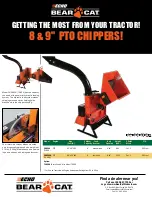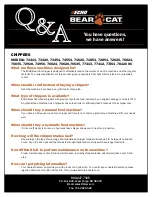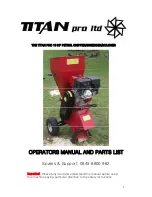
4.5 INCH HYDRAULIC CHIPPER
20
WARNING
BEFORE INSPECTING OR SERVICING ANY PART OF THIS MACHINE, SHUT OFF POWER SOURCE,
AND MAKE SURE ALL MOVING PARTS HAVE COME TO A COMPLETE STOP.
5.3 CHIPPER BLADE MAINTENANCE
5.4 REMOVING THE BLADES
The chipper blades will eventually become dull, making
chipping difficult and adding extra strain on the machine.
CHECK THE SHARPNESS OF THE BLADES EVERY
5-15 HOURS OF OPERATION AND SHARPEN AS
NEEDED.
Your blades need to be sharpened if:
● Machine vibrates severely when material is fed into
the chipper.
● Small diameter branches do not self-feed.
● Chips discharge unevenly or have stringy tails,
especially when chipping green branches.
Before you sharpen the chipping blades, check for
permanent damage. Replace the blade if:
● There are cracks, broken corners or nicks greater
than 1/8" (see below).
1. Remove the chipper deflector from the chipper
housing.
2. Rotate the rotor until a blade is accessible and install
the rotor lock (Section 5.2).
3. Remove the two hex bolts holding the blade to the
rotor.
4. To access the remaining blade, remove the punch or
screwdriver, reposition the rotor, and return the punch
or screwdriver to the rotor lock hole.
5. Repeat step 2 for the remaining blade.
6. Inspect blades to see if cracks or nicks are visible (see
Section 5.3).
5.5 SHARPENING THE BLADES
The blades can be ground on a bench grinder or by a
professional.
1. Never sharpen or grind the mounting surfaces of
the blades. This will cause the edge to roll and the
blade will be damaged, resulting in poor chipping
Broken
corner
Crack greater
than 1/8"
Nick greater
than 1/8"
performance.
2. Regrind the angled edge of the chipping blades to 45
degrees (see below). Make sure some type of fixture
is used to correctly hold the blade at the proper angle.
3. Be careful when grinding so that the blade does
not become overheated and change color. This will
remove the heat-treated properties.
● The base of the cutting edge is worn or has been
re-sharpened so that it no longer extends past the
chipping slot (see below).
4. Use short grinding times and cool with water or some
type of liquid coolant.
5. Remove an equal amount off each blade to maintain
rotor balance.
6. Small imperfections such as nicks and burrs on
Chipper
rotor
New
blade
Chipper
rotor
Chipping slot
Blade is too
short, must
be replaced
Chipping slot
the flat side of the blade will not affect the chipping
performance of the machine.
7. For blades that have been repeatedly sharpened,
ensure that the sharpened surface extends past the
chipping slot opening. If it does not extend past the
opening, the blades should be replaced.
Sharpened
Surface
Mounting Surface
(DO NOT GRIND)
Sharpened
Surface
WARNING
The chipping blades are sharp!! Use care when working
on the machine to avoid injury.
45˚
.50"
Mounting Surface
(DO NOT GRIND)
















































